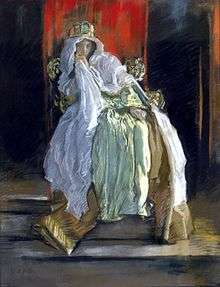The lady doth protest too much, methinks

"The lady doth protest too much, methinks" is a quotation from the c. 1600 play Hamlet by William Shakespeare. It has been used as a figure of speech, in various phrasings, to describe someone's overly frequent and vehement attempts to convince others of some matter of which the opposite is true, thereby making themselves appear defensive and insincere. In rhetorical terms, the phrase can be thought of as indicating an unintentional apophasis—where the speaker who "protests too much" in favor of some assertion puts into others' minds the idea that the assertion is false, something that they may not have considered before.
Original usage
The line, like most of Shakespeare's works, is in iambic pentameter. It is found in Act III, Scene II of Hamlet, where it is spoken by Queen Gertrude, Hamlet's mother. Hamlet believes that his father, the king, was murdered by his uncle Claudius (who then married Gertrude). Hamlet decides to stage a play, the Murder of Gonzago, that matches Hamlet's theory in its basic storyline, in order to test whether viewing it will trigger a guilty conscience on the part of Claudius. As Hamlet, Gertrude, Claudius and others watch the play-within-the-play, the Player Queen, representing Gertrude, declares in flowery language that she will never remarry if her husband dies. Hamlet then turns to his mother and asks her, "Madam, how like you this play?", to which she replies "The lady doth protest too much, methinks." Gertrude (who may or may not be aware that the queen in the play is a stand-in for her) is saying that the Player Queen is being too effusive. Hamlet replies, "O, but she'll keep her word."
Later uses
The quotation's meaning has changed somewhat since it was first written: whereas in modern parlance "protest" in this context often means a denial, in Shakespeare's time to "protest" meant "to make protestation or solemn affirmation," [1] and thus the phrase referred to a positive affirmation.
In popular culture
Alanis Morissette wrote a song titled "Doth I Protest Too Much" for her album So-Called Chaos.
In the David Ives play Venus In Fur, Vanda proclaims, "Methinks the lady doth protest too much," as she pries for information regarding Thomas' defensiveness about his sexual past.
"Me thinks the lady doth protest" is quoted by Gunther Hartog in the TV adaptation of Sidney Sheldon's If Tomorrow Comes.
"Me thinks the lady doth protest" is quoted in Channel 4 comedy Peep Show series 3 episode 1, and then again by Mark in series 8, but with the altered wording, "The lady doth eat bhajis too much, methinks."
The line is used by one of the characters in the movie (500) Days of Summer as a retort to the lead female's assertions that she doesn't believe in monogamous relationships.
The line was referenced in Spectacular Spider-Man television series. In episode 20, "Identity Crisis," the character Venom, while fighting against the show's titular character, states "The spider doth protests too much, wethinks," referencing the Shakespeare line but changed the sentence structure to fit the scene and characters.
The line was used by photography professor Mark Jefferson in the video game Life is Strange, in relation to the allegation of a rape by a female student against a wealthy, unlikeable male student, attempting to deflect attention from the hidden fact that he was responsible for what happened to her.
See also
References
- ↑ OED, "protest" 1b